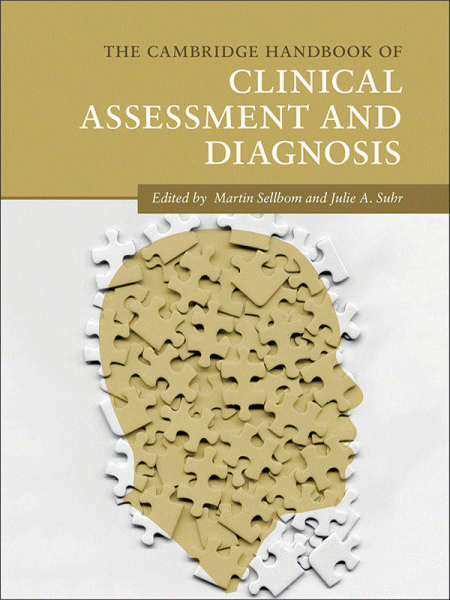Περιγραφή
This Handbook provides a contemporary and research-informed review of the topics essential to clinical psychological assessment and diagnosis. It outlines assessment issues that cross all methods, settings, and disorders, including (but not limited to) psychometric issues, diversity factors, ethical dilemmas, validity of patient presentation, psychological assessment in treatment, and report writing. These themes run throughout the volume as leading researchers summarize the empirical findings and technological advances in their area. With each chapter written by major experts in their respective fields, the text gives interpretive and practical guidance for using psychological measures for assessment and diagnosis.
- Provides an up-to-date, research-informed review of each topic
- Includes interpretive and practical recommendations for clinical assessment
- Covers the issues surrounding diversity in assessment and diagnosis
- Experts summarise the technological advances in their area
Περιεχόμενα
1. Introduction to the The Cambridge Handbook of Clinical Assessment and Diagnosis Julie A. Suhr and Martin Sellbom
Part I. General Issues in Clinical Assessment and Diagnosis:
2. Psychometrics and psychological assessment John Hunsley and Teresa Allan
3. Multicultural issues in clinical psychological assessment Frederick Leong, P. Priscilla Lui, and Zornitsa Kalibatseva
4. Ethical and professional issues in assessment Linda K. Knauss
5. Contemporary psychopathology diagnosis Christopher C. Conway, Lee Anna Clark and Robert F. Krueger
6. Assessment of non-credible reporting and responding Dustin B. Wygant, Danielle Burchett and Jordan P. Harp
7. Technological advances in clinical assessment: ambulatory assessment Timothy J. Trull, Sarah A. Griffin and Ashley C. Helle
8. Psychological assessment as treatment: collaborative/therapeutic assessment E. Hale Martin
9. Writing a psychological report using evidence-based psychological assessment methods R. Michael Bagby and Shauna Solomon-Krakus
Part II. Specific Clinical Assessment Methods:
10. Clinical interviewing John Sommers-Flanagan, Veronica I. Johnson and Maegan Rides At The Door
11. Multi-informant assessment of psychopathology from preschool through old age Thomas M. Achenbach, Masha Y. Ivanova and Leslie A. Rescorla
12. Intellectual assessment Lisa Whipple Drozdick and Jennifer Puig:
13. Achievement assessment Jennifer White, Nancy Mather, Deborah Anne Schneider and Jennifer Braden Kirkpatrick
14. Using vocational assessment tests Jane L. Swanson
15. Neuropsychological testing and assessment Julie A. Suhr and Kaley Angers
16. Minnesota Multiphasic Personality Inventory – 2 – Restructured Form (MMPI-2-RF) Yossef S. Ben-Porath, Martin Sellbom and Julie A. Suhr
17. Personality Assessment Inventory Leslie C. Morey and Morgan N. McCredie
18. The Millon Clinical Multiaxial Inventory-IV (MCMI-IV) Seth Grossman
19. Self-report scales for common mental disorders: an overview of current and emerging methods Matthew Sunderland, Philip Batterham, Alison Calear, and Natacha Carragher
20. Performance-based techniques Gregory J. Meyer and Joni L. Mihura
Part III. Assessment and Diagnosis of Specific Mental Disorders:
21. Assessment of childhood neurodevelopmental disorders Lindsey Williams, Rachel Sandercock and Laura Grofer Klinger
22. Assessment of childhood disruptive behavior disorders and ADHD Christopher T. Barry, Rebecca A. Lindsey and Alyssa A. Neumann
23. Assessment of depressive disorders and suicidality Ronald R. Holden and G. Cynthia Fekken
24. Assessment of anxiety disorders and obsessive-compulsive disorder Lorna Peters, Lauren F. McLellan, and Keila Brockveld
25. Assessment of trauma- and stressor-related disorders Daniel J. Lee, Sarah E. Kleiman and Frank W. Weathers
26. Assessment of people with psychotic and bipolar disorders Rachel Brand, Greg Murray and Neil Thomas
27. Assessment of eating disorders Tracey Wade and Mia Pellizzer
28. Assessment of substance use disorders James Langenbucher
29. Assessment of personality disorder Leonard J. Simms, Trevor F. Williams and Chloe M. Evans
30. Neuropsychological assessment of dementia David P. Salmon
31. Traumatic brain injuries Lilian Salinas and William Barr
Part IV. Clinical Assessment in Specific Settings:
32. Screening and assessment in integrated primary care settings Jeffrey L. Goodie and Kevin Wilfong
33. Psychological Assessment in forensic settings Patricia A. Zapf, Amanda Beltrani and Amanda L. Reed
34. Assessment issues within neuropsychological settings F. Taylor Agate and Mauricio A. Garcia-Barrera
35. Assessment in educational settings Benjamin J. Lovett and Jason M. Nelson.












